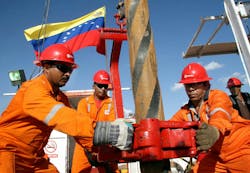Biden administration reinstates oil sanctions on Venezuela
Six months after it suspended sanctions on exports of Venezuelan oil and investments in the country’s oil and gas sector, the Biden administration on Apr. 18 reimposed them, citing Caracas’ lack of progress in meeting election-reform commitments.
The US Treasury Department’s Office of Foreign Asset Control (OFAC) gave companies until May 31 to “wind down” previously authorized oil operations.
The Biden administration in November 2023 dropped the sanctions for 6 months after Venezuela moved forward with political reforms (OGJ Online, Nov. 6, 2023). The administration allowed the suspension to expire at midnight on Apr. 17 as reform commitments unraveled.
"We are concerned that [Venezuelan President Nicolas] Maduro and his representatives prevented the democratic opposition from registering the candidate of their choice, harassed and intimidated political opponents, and unjustly detained numerous political actors and members of civil society," State Department spokesperson Matthew Miller said in a statement.
“We again call on Maduro to allow all candidates and parties to participate in the electoral process and release all political prisoners without restrictions or delay,” he added.
The Trump administration imposed sanctions on Venezuela’s oil industry in 2019 after Maduro’s reelection victory, which US and other Western governments rejected as fraudulent.
OFAC said the sanctions apply to:
- Production, lifting, sale, and exportation of oil or gas from Venezuela, and provision of related goods and services.
- Payment of invoices for goods or services related to oil or gas sector operations in Venezuela.
- New investment in oil or gas sector operations in Venezuela.
- Delivery of oil and gas from Venezuela to creditors of the government of Venezuela, including creditors of state-owned oil and gas company Petroleos de Venezuela SA (PDVSA) entities for the purpose of debt repayment.
While Venezuela had the world’s largest proven crude oil reserves in 2023, with about 303 billion bbl, it only produced 742,00 b/d last year, 70% less than in 2013, according to the US Energy Information Administration (EIA). In 2001, the US imported 1.3 million b/d from Venezuela, EIA added.
Last year after sanctions were suspended, EIA expected only modest production growth of 200,000 b/d from Venezuela, citing years of underinvestment and mismanagement in the country’s oil sector (OGJ Online, Oct. 23, 2023).
The renewed sanctions could drive down production, adding to Venezuela’s decade-long economic woes. Nearly 8 million Venezuelans have left the country since 2014, according to the UN Refugee Agency.
About the Author
Cathy Landry
Washington Correspondent
Cathy Landry has worked over 20 years as a journalist, including 17 years as an energy reporter with Platts News Service (now S&P Global) in Washington and London.
She has served as a wire-service reporter, general news and sports reporter for local newspapers and a feature writer for association and company publications.
Cathy has deep public policy experience, having worked 15 years in Washington energy circles.
She earned a master’s degree in government from The Johns Hopkins University and studied newspaper journalism and psychology at Syracuse University.
